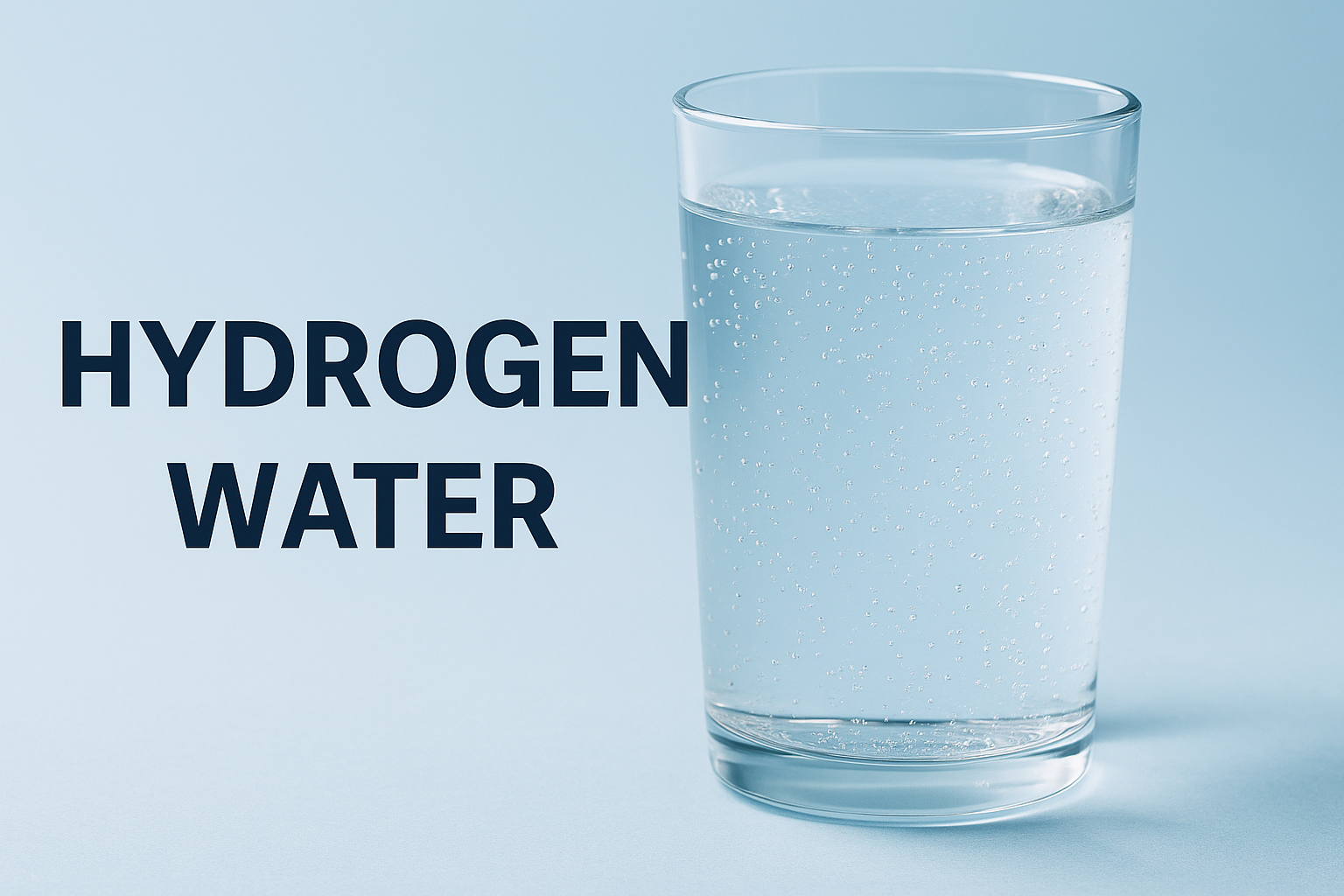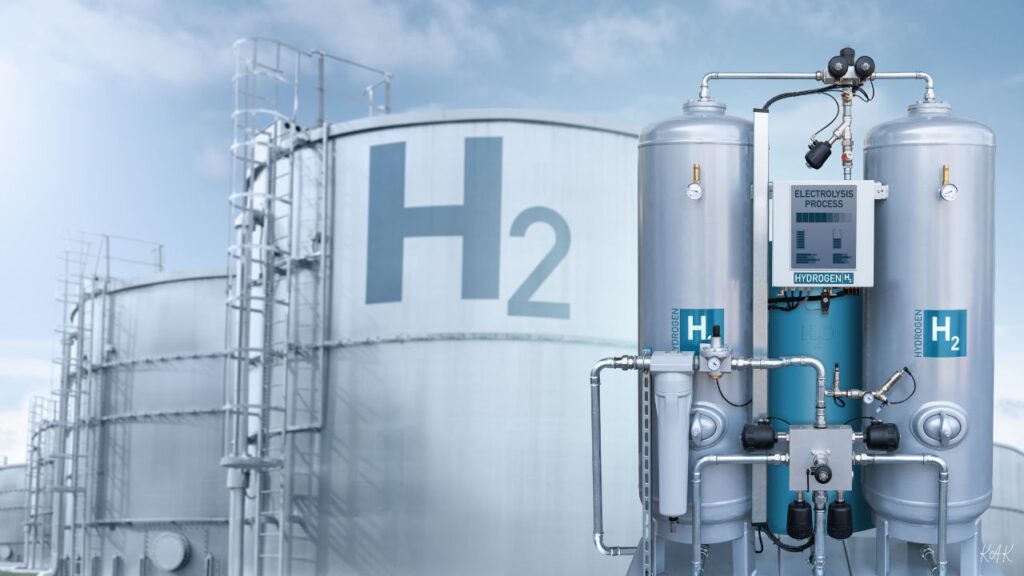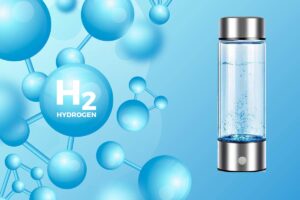Introduction: The Rising Buzz Around Hydrogen Water
If you’ve been keeping up with the latest wellness trends, you’ve probably seen hydrogen water making waves on social media, in health blogs, and even in high-end gyms.
Marketed as a next-generation hydration solution, hydrogen water promises benefits ranging from improved athletic performance to anti-aging effects. But what exactly is it, and does science support these claims?
This guide takes a deep dive into all about hydrogen water—covering how it’s made, what research says, the myths to avoid, and tips for choosing quality products.
What is Hydrogen Water?
Simply put, hydrogen water is ordinary water (H₂O) infused with extra molecular hydrogen gas (H₂). The idea is that these dissolved hydrogen molecules can act as powerful antioxidants, helping to neutralize harmful free radicals in the body.
Unlike mineral water or flavored water, hydrogen water is not defined by taste or mineral content. Its main selling point is the invisible, odorless hydrogen gas dissolved in it.

Caption: A refreshing glass of hydrogen water, rich in dissolved hydrogen for potential health benefits.
How is Hydrogen Water Made?
There are several methods to create hydrogen-rich water, each varying in cost and hydrogen concentration:
- Electrolysis Machines – Specialized devices split water molecules into hydrogen and oxygen, then dissolve hydrogen back into the water.
- Hydrogen Tablets or Powders – These react with water to release hydrogen gas.
- Pre-Bottled Hydrogen Water – Commercially packaged with special sealing to retain hydrogen content.
- Hydrogen Infusion Sticks – Portable tools that release hydrogen into water when submerged.
The concentration is often measured in parts per million (ppm)—higher ppm levels generally mean more potential antioxidant activity.
The Science Behind Hydrogen Water
Antioxidant Potential
Free radicals are unstable molecules that can damage cells and accelerate aging. Antioxidants help neutralize them, and hydrogen gas is thought to be a selective antioxidant,
targeting only harmful radicals while sparing beneficial ones.
Clinical Studies
Research on hydrogen water is still relatively new, but early studies suggest potential benefits:
- Reduced Muscle Fatigue: Some studies on athletes found lower levels of lactate after exercise when drinking hydrogen water.
- Anti-Inflammatory Effects: Preliminary findings indicate hydrogen water may help reduce inflammation markers.
- Cognitive Support: Animal studies suggest neuroprotective properties, though human research is limited.
Important Note: While promising, most human studies are small-scale, and large clinical trials are needed to confirm long-term effects.
Claimed Benefits of Hydrogen Water
Supporters of hydrogen water cite a range of potential health benefits:
- Improved Energy Levels – Possible due to reduced oxidative stress on cells.
- Better Recovery for Athletes – Hydrogen water may speed up post-workout recovery.
- Skin Health & Anti-Aging – Antioxidants can help fight skin damage from free radicals.
- Reduced Inflammation – Potential aid for people with inflammatory conditions.
- Enhanced Cognitive Function – May protect against oxidative stress-related brain decline.
While these benefits sound appealing, it’s important to remember that scientific consensus is not yet established.
Myths and Misconceptions
Like many wellness trends, hydrogen water has its share of myths:
- “It’s Just Expensive Water” – While hydrogen water does cost more, it is chemically different due to dissolved H₂ gas.
- “It Can Cure Diseases” – No credible research supports hydrogen water as a cure for chronic illnesses like cancer or diabetes.
- “All Hydrogen Water is the Same” – Concentration levels vary greatly depending on the production method and storage.
- “You Can Taste the Hydrogen” – Molecular hydrogen is tasteless and odorless; any flavor differences come from the container or added minerals.
Safety and Side Effects
Hydrogen water is generally considered safe to drink. The U.S. Food and Drug Administration (FDA) recognizes hydrogen gas as GRAS (Generally Recognized As Safe) for consumption.
Potential Considerations:
- May not be suitable for individuals with specific medical conditions; consult your doctor if unsure.
- Quality control can be an issue—low-grade products might not contain meaningful hydrogen levels.
How to Choose the Best Hydrogen Water
When selecting hydrogen water products, consider:
- Hydrogen Concentration (ppm): Look for at least 1.0–1.5 ppm for noticeable effects.
- Sealed Packaging: Prevents hydrogen from escaping before you drink it.
- Lab Testing: Brands that provide independent test results inspire more trust.
- Freshness: Hydrogen dissipates over time, so the fresher it is better.
- Price-to-Benefit Ratio: Decide whether the cost aligns with your personal health goals.
How to Incorporate Hydrogen Water into Your Lifestyle
- Post-Workout Recovery: Drink it within 30 minutes after exercise for potential muscle recovery benefits.
- Morning Hydration: Start your day with a glass to combat overnight oxidative stress.
- Travel Hydration: Portable hydrogen tablets or bottles are convenient for flights and long drives.
- Skin Care: Some enthusiasts use hydrogen water for facial rinses, though evidence is anecdotal.

Cost vs. Value
Hydrogen water is undeniably more expensive than regular water. A single bottle can range from $3 to $8, and home machines can cost hundreds or thousands of dollars. Weigh the cost against potential benefits and your overall wellness budget.
The Bottom Line
Hydrogen water is an exciting trend in the wellness space, blending ancient simplicity (water) with modern science (molecular hydrogen).
While early studies are promising—particularly in reducing oxidative stress—more robust research is needed to validate its long-term benefits fully.
If you’re curious, trying hydrogen water for a few weeks can help you decide if it’s worth the investment. Just remember: it’s not a magic bullet, but it can be a helpful addition to a balanced lifestyle.
For more information and updates, visit our website: Nicholas Perricone, MD.



